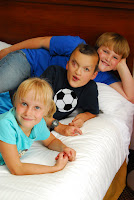 |
| Sasha, 4, in September 2011 |
Young girls are highly prized by adoptive families, yet
seven months after meeting Love, Sasha still waits to be chosen. Diagnosed with hepatitis C, a chronic and
currently incurable illness of variable course and prognosis, the risks and the
unknowns have been sufficient to leave this precious girl languishing motherless
in an orphanage far longer than her age suggests would be necessary.
So she joined our Lighthouse Project trip to her region in
April. The chaperone, Svetlana, a soft-spoken
caretaker from Sasha’s orphanage, kept the small girls close. Sasha didn’t know me, and maintained a healthy
distance as I watched her settle into the room she and Svetlana shared. While the chaperone tended another child,
Sasha shed her coat and hat, and began combing her hair. Tongue outside her
mouth in focused concentration, every task was dispatched as an urgent mission.
 |
| Sasha in her thinking pose |
Our second day with the kids, I spoke to those without waiting
families. Never having interviewed
orphans before, I fretted about balancing my need to glean compelling writing material
with the kids’ need for sensitivity regarding the traumas of their pasts. Sasha was an early interviewee, and my inexperience
paired with her reserve squeezed a prayer from me as she shuffled into my room clad
only in shirt, tights, and sandals. She
sat where I pointed, and nodded solemnly when I explained my hope of knowing
her better. Promising her a Pixy Stix
afterward, I asked her to answer my questions as best she could.
 |
| Sasha in the young orphan's "uniform" she wore for her interview with me |
I asked Svetlana’s opinion later. She laughed as she described Sasha as “serious
and responsible,” remembering that whenever instructed to commit a poem to
memory, she fully engaged the assignment.
When it was her turn to set the table for her group, she would don the
required uniform as if her job were a weighty matter. Eyewitness to those
traits all week, I was smitten with the little girl.
 |
| Sasha swimming with the help of kind Denis, who along with his three siblings now has a family of his own |
Help Sasha by clicking to Tweet
 |
| Sasha's smile for me |
While Sasha dreams of being a mother someday, at four she
needs a mother herself,
one whose mission is to face with her the unknowns of a difficult diagnosis,
and to shepherd her through life's other trials and triumphs. It would be a tragedy if Sasha’s gauzy
understanding of “mama” ended at the dusting of shelves or playing and walking.
So my
dream is that she’ll learn soon of the comfort of a mother there to guide her
and treasure her always.
Help Sasha by clicking to Tweet
Help Sasha by clicking to Tweet
If you would like to make a 100% tax-deductible contribution to a fund designated to benefit Sasha's adoption, it could help her find a family, and then get home sooner. Please note that if Sasha's future adoptive family does not need assistance, or if Sasha enters foster care in Russia or elsewhere, any donations to this fund will benefit the adoption of another needy Lighthouse Project child. If you have questions, please call (616) 245-3216, or e-mail me a becky@lhproject.com. Thank you for your compassion and generosity!















